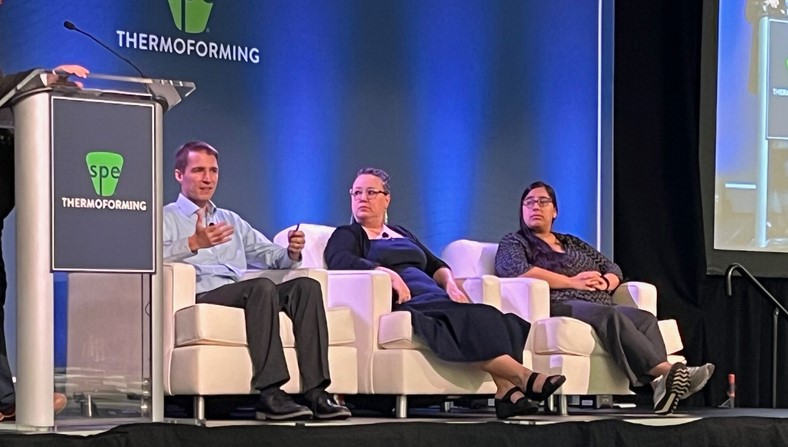Recycling of PET thermoforms needed for circular economy
main text
Recycling of PET thermoforms needed for circular economy

From left: Zach Muscato, corporate sustainability manager with thermoformer Plastic Ingenuity; Kristina Hansen, president of Plastics Forming Enterprises LLC; and Katy Ricchi, consulting engineer with Resource Recycling.
Recycling PET thermoforms has potential, but is facing a number of challenges, according to a three-person panel discussion Oct. 26 at the Society of Plastics Engineers Thermoforming Conference in Cleveland.
An industry study launched in 2021 showed that about 1.5 billion pounds of thermoformed PET waste is generated in the U.S. every year.
That material has a recycling rate of less than 10 percent, according to Kristina Hansen, president of Plastics Forming Enterprises LLC, a testing and consulting firm in Merrimack, N.H. PET thermoform content in recycling bales can range from 2-12 percent, she added.
"As the amount of thermoforms [in recycling] goes up, yield loss increased," Hansen said. "Thermoforms essentially replace [PET] bottles in bales, so it's more efficient to separate them from bottles in recycling streams."
When PET thermoforms are recycled, the material has been rated as high quality. In recent lab testing, there were "no issues or concerns" after thermoforms were added to PET flake, Hansen said.
Looking at the broader recycling market, Zach Muscato said "there's no way to achieve true circularity without including [PET] thermoforms."
"We have a role to play in getting [thermoforms] back," added Muscato, corporate sustainability manager with thermoformer Plastic Ingenuity in Cross Plains, Wis. "Brand owners are putting importance on circular goals and PET thermoform demand is growing because of their use in protecting food and preserving preserve shelf life, as well as with medical devices and pharmaceutical products."
Muscato added that PET thermoforms have lower carbon footprint vs. glass, aluminum and paper, but that thermoformers "have to work on recovery … with only 10 percent recycled, there's a lot of room for improvement."
Thermoformers are focusing on designing PET trays to be more recyclable, Muscato said. He added that "the biggest hiccup" in PET thermoform recycling can be label selection, since paper-based labels "aren't good for recycling."
For PET thermoform recycling, "the collection piece is a big part," according to Katy Ricchi, consulting engineer with Resource Recycling, a consulting firm in West Bloomfield Township, Mich. "There are conflicting programs in the U.S. … Most recyclers cap their PET thermoform volume at 10 percent to send to MRFs [material recovery facilities]."
Ricchi added that a recent drop in post-consumer PET demand from fiber markets — including carpet, strap and automotive — hasn't helped demand for recycled PET thermoforms.
And if PET thermoforms don't make lists of recyclable items in some states, she said that the industry faces "an existential threat" in the risk of material deselection in favor of polypropylene or non-polymer materials.
PET thermoform recycling has been helped by a recent push in the U.S. to accept recycled materials in consumer products even if the color isn't perfect when compared to virgin materials.
"Consumers will purchase a product because it's sustainable," Ricchi said. "The color isn't quite perfect, but the consumer feels like they're playing a part."
* Source : https://www.plasticsnews.com/resin-pricing/pp-resin-prices-continue-climb
* Edit : HANDLER
- PreviousAuto industry analysts remain optimistic with tool and die outlook 23.12.20
- NextPP resin prices continue to climb 23.11.19
